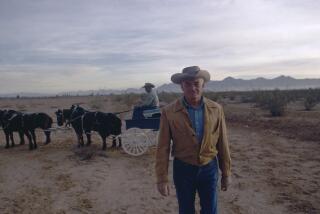Arabians Find Paradise on Arizona Range
- Share via
SCOTTSDALE, Ariz. — For decades, this city and the nearby valley have welcomed Arabian horses, not just as visitors but as big business.
Surrounded by ranches and breeding areas, Scottsdale has become the Southwest’s hub for breeding and raising, training and riding, buying and selling the majestic creatures--and has become known internationally as an Arabian paradise.
Along the way, Arabians have become to Arizona what Thoroughbreds are to Kentucky. The Fall and Futurity show, sponsored by the Arabian Horse Assn. of Arizona last month, warms up winter’s traditional hoopla.
Eight-year-old Elena Ugliepta showed her love for her horse at the show. A competitor in the 13-and-under showmanship class, she doted on Adijahn, bestowing very public kisses.
Dedication to the animals was clear even with less demonstrative trainers, such as Rod Owens of Chandler, Ariz., who exercised H.R. Freedom at dawn during the show.
Groom Nolene Lowrey was not shy either. “Horses have always been a part of my life,” she said, displaying a horse-head tattoo on her shoulder. “They will always be with me.”
The November show is just one showcase for the horses. The All Arabian Horse Show, planned for early 1999 in Scottsdale, often draws more than 300,000 visitors. Entering its 44th year, the show remains one of the world’s largest Arabian horse events.
Locals have shown their appreciation for the shows and the horses they celebrate. City planners protect horse-riding trails. Developers build luxury “equestrian residences” with barns, training and exercise areas--plus a condo, of course.
Excellent endurance racers, Arabians are considered the “brains” among horse breeds. Bedouin riders in the Middle East considered their horses gifts from God, fashioned from a desert breeze. The line originated 20 centuries ago, traceable to just three racehorses: the Byerly Turk, the Darley Arabian and the Godolphin.
Two purebred stallions--gifts from the Turkish sultan to Gen. Ulysses S. Grant--arrived in the United States in 1873. Twenty years later, the Turkish exhibit at the Chicago World’s Fair had 45 Arabians and was a hit. One of the largest shipments followed, arranged by Teddy Roosevelt in 1906. To keep track, the Arabian Horse Registry of America began in 1908.
Arabian horses began arriving in Arizona in the 1930s when such prominent families as the Wrigleys and McCormicks bought horse ranches. The arid desert climate proved irresistible. The area has bred champions for decades, with sales records following racetrack records.
More to Read
Sign up for The Wild
We’ll help you find the best places to hike, bike and run, as well as the perfect silent spots for meditation and yoga.
You may occasionally receive promotional content from the Los Angeles Times.






